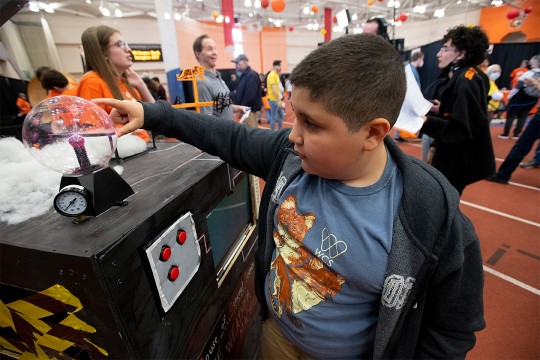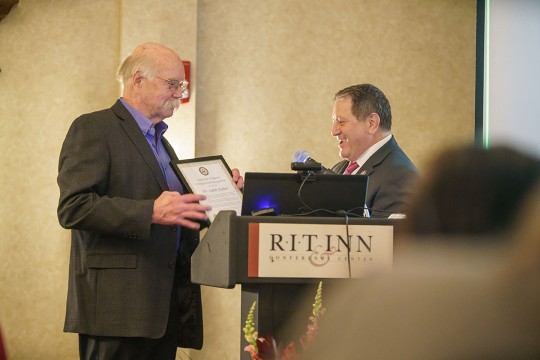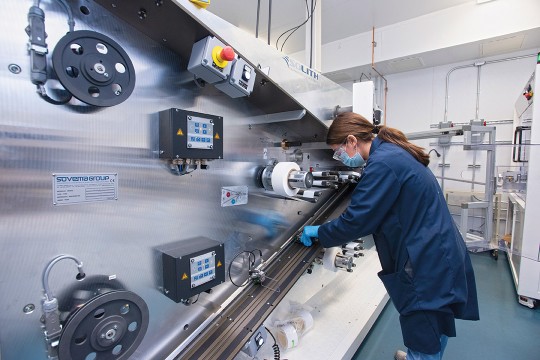Research News
- RIT/
- College of Engineering/
- Research/
- Research News
-
April 23, 2022

Thousands enjoy attending Imagine RIT: Creativity and Innovation Festival
After going virtual for 2021, thousands of people came to the RIT campus on Saturday for an in-person Imagine RIT: Creativity and Innovation Festival, which featured more than 250 exhibits throughout the campus from more than 1,800 students and faculty.
-
April 12, 2022

Computer chip technology aligns with RIT’s microelectronic engineering program growth
Research findings and signs of computer chip industry demands were the top subjects at the 40th Annual Microelectronic Engineering Conference April 8 at RIT. With indications of growth and novel functions being developed, there were also discussions of the pressing need for even more skilled workers in the field to sustain that expected growth.
-
April 5, 2022

Satish Kandlikar recognized as a top researcher in his field by Research.com
Satish Kandlikar, professor of mechanical engineering, has been recognized by Research.com as one of the country’s top researchers in his field. This first edition of the national and international rankings of more than 3,600 mechanical and aerospace engineering scientists from around the world included Kandlikar, who ranks 31st in the U.S., and 54th in the world ranking.
-
March 30, 2022

RIT researchers contribute integrated photonics technology to develop new point-of-care system for diagnosing coronavirus
RIT’s team will develop the technology needed for a point-of-care diagnostics system built on integrated photonics. Capable of accurate detection of SARS-CoV-2 antibodies, the new system could reduce the need for expensive equipment and specialized expertise to better inform care decisions in underserved, resource-limited communities.
-
March 25, 2022

National manufacturing institute led by RIT marks five years
A national manufacturing institute led by Nabil Nasr, associate provost and founding director of RIT’s Golisano Institute for Sustainability, is marking five years of accelerating the transition to a circular economy in the United States.
-
March 14, 2022

Faculty research improves smart warehouse technology and material handling options
Soon industrial robots in warehouses will be smart enough to know which has the right of way in busy aisles. Researchers at RIT are developing an intelligent materials handling system for warehouses that integrates smart technologies.
-
February 23, 2022

RIT’s remote sensing experts help scientists keep an eye on the Earth
Scientists from RIT’s Chester F. Carlson Center for Imaging Science recently helped successfully bring the new Landsat 9 satellite online and are partnering with a startup on a bold new initiative to help scientists in government and the private sector monitor changes in the Earth’s surface temperature.
-
February 3, 2022

Semiconductors at RIT: What they are, how their lab makes them, and how they teach them
WROC-TV talks to Sean Rommel, professor and director of the microelectronic engineering program, and Michael Jackson, associate professor in the Department of Electrical and Microelectronic Engineering, about semiconductors.
-
January 31, 2022

Battery Prototyping Center doubles capacity to serve clients
Since opening six years ago, RIT’s Battery Prototyping Center has nearly doubled its research and development projects with battery manufacturers from Boston to Silicon Valley. More industries are exploring designs for commercial quality lithium-ion batteries and seeking experts at the center to provide research about the development of different styles of batteries.
-
January 31, 2022

Biomedical engineering professor influencing next generation
As an expert in microfluidic devices—tiny labs able to decipher bioparticles—Blanca Lapizco-Encinas and her research partners uncovered a mystery in how these particles can be better differentiated. As she has moved her own research forward, she is influencing a new generation of scientists to do the same.
-
January 31, 2022

Tait Preserve becoming hotbed for interdisciplinary research
RIT has an emerging new hotspot for interdisciplinary research about 25 minutes from the main campus. The Tait Preserve includes a 60-acre lake and a private mile of Irondequoit Creek adjacent to Ellison Park, offering endless opportunities for research, education, and conservation activities.
-
January 17, 2022

RIT professor Poornima Padmanabhan honored with NSF CAREER Award
Scientists look to space for origins of the solar system; chemical engineers like Poornima Padmanabhan are searching for the origins of life based on minute systems of molecules. Padmanabhan recently received a National Science Foundation Faculty Early Career Development (CAREER) award for “Chirality and polymer thermodynamics: frustration and amplification.”


